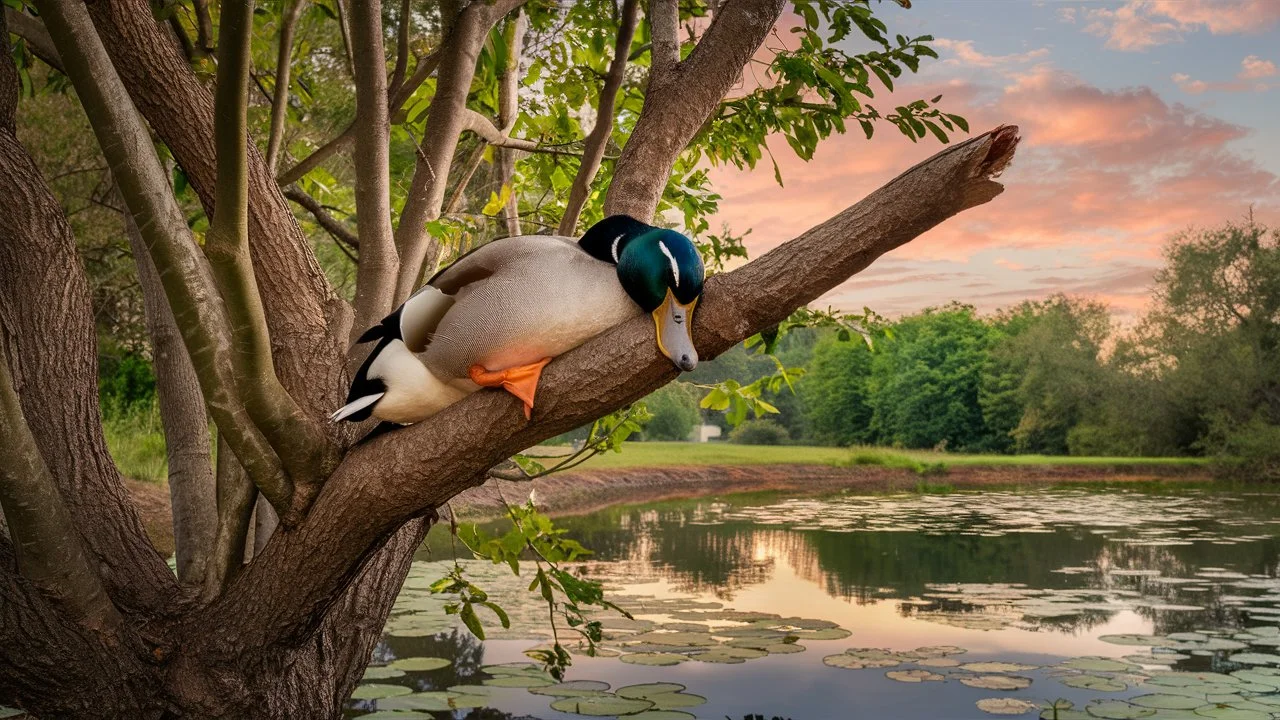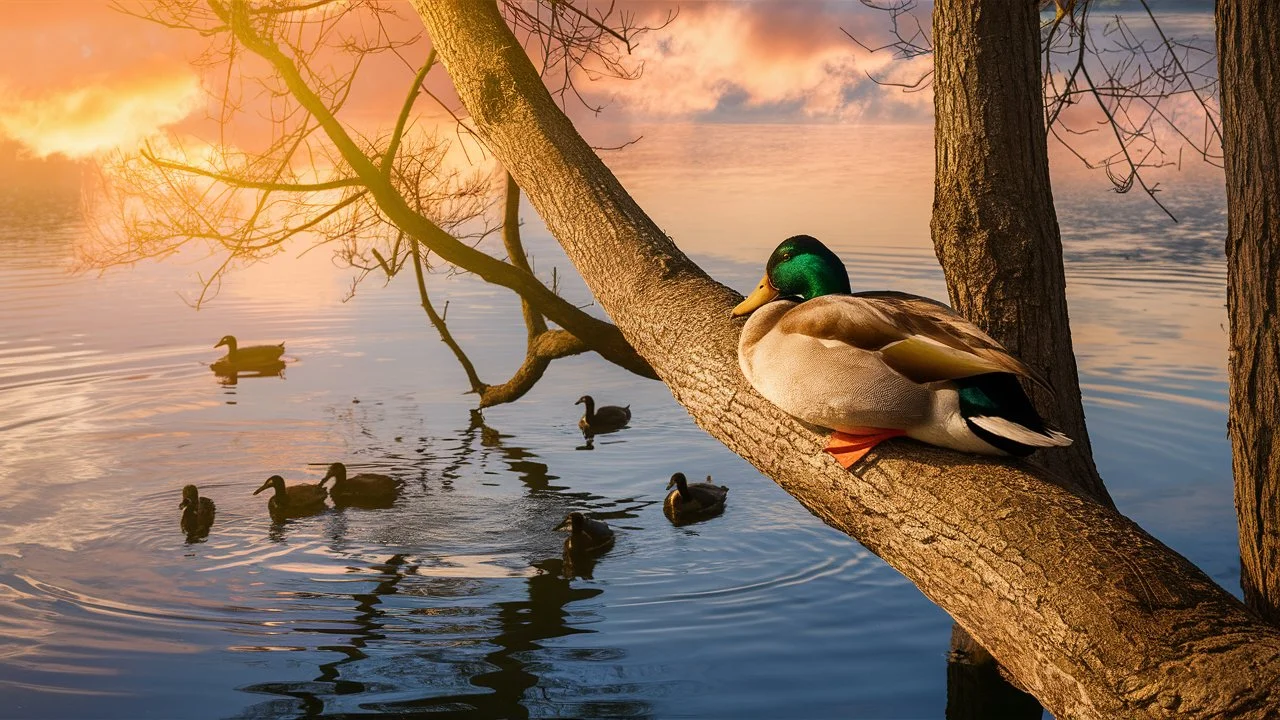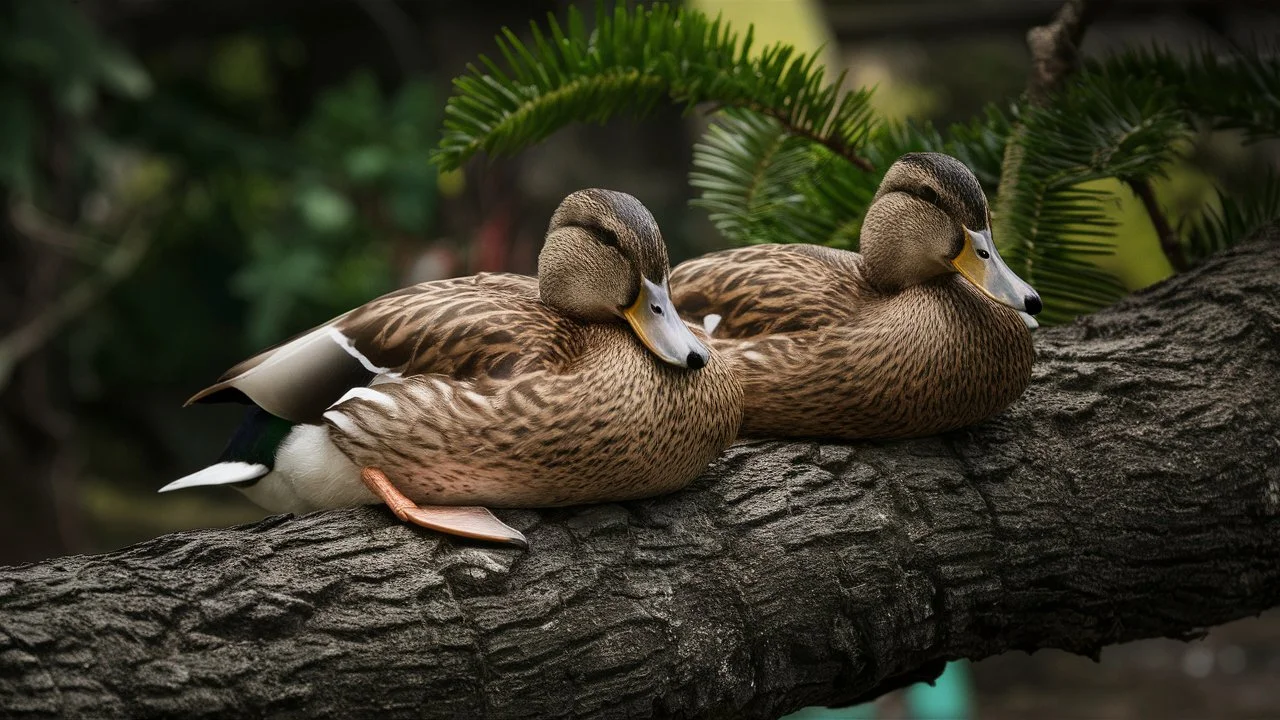Ducks are common and fascinating birds that many people enjoy watching around lakes, ponds and rivers. Known for their quacking sounds, webbed feet, and impressive swimming abilities, ducks have unique behaviors and habits. One intriguing question about ducks is their sleeping habits. Where do ducks sleep? Do ducks sleep in trees like some other birds? Let’s explore the sleeping habits of ducks in more detail.
Yes, some ducks particularly perching ducks, do sleep in trees. They have special adaptations like strong claws that help them grip branches securely.
Where Do Ducks Sleep?
Ducks have different sleeping places depending on their species, environment and safety needs. Generally, ducks sleep on water, land or sometimes in trees.
Related reading: Do Ducks Land in Trees?
Here’s a closer look at each of these places.

Sleeping on Water
Most ducks prefer to sleep on water, a choice that offers them a degree of safety from land-based predators. Sleeping on water is particularly advantageous because:
- Safety in Numbers: Ducks often sleep in groups, a behavior known as “rafting.” By floating together, they create a larger presence that is harder for predators to approach undetected.
- Water as a Barrier: Predators find it difficult to approach ducks on water without making noise or causing ripples, giving the ducks a chance to wake up and escape.
When sleeping on water, ducks have a unique way of resting. They tuck their heads under their wings and float gently. Some species have the ability to sleep with one eye open. This phenomenon, called unihemispheric slow-wave sleep, allows one half of their brain to rest while the other half remains alert to potential dangers.
Sleeping on Land
Ducks also sleep on land, especially if water bodies are unsafe or unavailable. On land, ducks seek out areas that offer protection from predators and harsh weather. Common land sleeping spots include:
- Shorelines and Islands: These locations are close to water but provide a solid ground for resting.
- Tall Grass and Bushes: Ducks hide in tall grass or under bushes to stay out of sight from predators.
- Sheltered Spots: Ducks look for places that offer cover from wind, rain, and potential threats, such as under trees, in reeds, or among rocks.
While sleeping on land, ducks usually sleep in groups. This group sleeping provides added protection as ducks can alert each other to danger. Ducks often rotate the role of sentinels, with some staying awake to watch for predators while others sleep.
Do Ducks Sleep in Trees?
While most ducks do not sleep in trees, some species, known as perching ducks, do. Perching ducks have evolved special adaptations that allow them to roost in trees safely. These adaptations include:
- Strong Claws: Unlike other ducks, perching ducks have strong claws that can grip branches tightly, allowing them to perch securely.
- Balance and Agility: Perching ducks are more agile and better at balancing on branches compared to other duck species.
Perching ducks typically live in wooded areas near water. By sleeping in trees, they avoid many ground-based predators and gain a vantage point to observe their surroundings. Some common perching ducks include the Wood Duck and the Mandarin Duck, which are often found in North America and Asia, respectively.
Why Don’t All Ducks Sleep in Trees?
Most ducks are not equipped to sleep in trees due to their physical characteristics and lifestyle. The primary reasons include:
- Webbed Feet: Most ducks have webbed feet, which are excellent for swimming but not suited for gripping branches. Webbed feet make balancing on tree branches difficult and unsafe.
- Body Weight: Many duck species have a heavier body structure, making it challenging to perch on thin branches without risking a fall.
- Habitat Preferences: Most ducks prefer habitats with ample water bodies where they can swim and forage, making water and land more practical sleeping choices.
How Do Ducks Stay Safe While Sleeping?
Ducks have developed several strategies to stay safe while sleeping. These strategies include:
- Sleeping in Groups: Group sleeping allows ducks to watch out for each other. If one duck senses danger, it can alert the entire group.
- Floating on Water: Water provides a natural barrier against many predators, making it a safer sleeping environment.
- Finding Hidden Spots: On land, ducks seek hidden spots like tall grass, bushes, or sheltered areas to avoid detection by predators.
- Unihemispheric Sleep: Some ducks sleep with one eye open, allowing half of their brain to remain alert while the other half rests. This helps them quickly detect and react to threats.
What Predators Do Ducks Need to Watch Out For?
Ducks face threats from various predators, depending on their habitat. Common predators include:
- Foxes: Foxes are agile hunters that can attack ducks on land or even venture into shallow water.
- Hawks and Eagles: Birds of prey can swoop down and catch ducks, especially when they are young or vulnerable.
- Raccoons: Raccoons are nocturnal predators that can pose a threat to ducks, particularly at night.
- Snakes: In some regions, snakes can be a danger to ducks, especially ducklings.
How Do Ducklings Sleep?
Ducklings, or baby ducks, have different sleeping habits compared to adult ducks. They rely heavily on their mother for protection. Key aspects of duckling sleep include:
- Huddling Together: Ducklings sleep huddled together for warmth and safety. This also helps them stay close to their mother.
- Maternal Protection: The mother duck watches over the ducklings while they sleep, alerting them to any danger and leading them to safety if needed.
- Hidden Spots: Just like adult ducks, ducklings sleep in hidden or sheltered spots to avoid predators.
Seasonal Changes in Sleeping Habits
Ducks’ sleeping habits can change with the seasons. In winter, when water bodies may freeze over, ducks adapt their sleeping patterns:
- Sleeping on Land: Ducks may sleep on land more often during winter, seeking sheltered spots that provide protection from the cold and wind.
- Migration: Many duck species migrate to warmer regions during the winter, where they can find open water and safer sleeping places. Migration ensures they have access to food and suitable habitats year-round.
Do Ducks Sleep in Trees During the Day?
Yes, some ducks do sleep in trees during the day, especially perching ducks. Here’s why and how they do it:
- Safety and Predation: Sleeping in trees during the day provides ducks with a safe place away from ground-based predators. By roosting high in the trees, they can avoid threats like foxes, raccoons, and other terrestrial animals.
- Rest and Alertness: Daytime naps in trees allow ducks to rest while remaining alert. Perching in trees gives them a vantage point to observe their surroundings. They can spot potential threats from a distance and react quickly if needed.
- Habitat Preferences: Ducks that live in wooded areas with plenty of trees naturally use these structures for resting. Trees provide a convenient and safe resting spot close to their feeding and nesting areas.

Daytime Sleeping Behavior
During the day, ducks, including those that sleep in trees, exhibit certain behaviors to ensure their safety and comfort:
- Finding the Right Spot: Ducks choose branches that are strong and secure. They often look for spots that provide some cover, such as branches with foliage, to stay hidden from predators and harsh weather conditions.
- Group Roosting: Just like they do on water or land, ducks often sleep in groups when roosting in trees. Group sleeping helps them stay safer, as multiple ducks can keep watch for danger.
- Short Naps: Ducks do not sleep for long periods during the day. Instead, they take short naps, which are sometimes called “catnaps.” These naps help them recharge without losing too much alertness.
Benefits of Daytime Tree Sleeping
Sleeping in trees during the day offers several benefits to ducks:
- Increased Safety: By roosting in trees, ducks can avoid many ground-based predators. This is especially important during the day when some predators are more active.
- Energy Conservation: Short naps in trees allow ducks to conserve energy. They can rest without the risk of being disturbed or attacked, which helps them stay active and healthy.
- Environmental Adaptation: Tree-roosting is an adaptation that helps perching ducks thrive in their specific habitats. It allows them to make the most of their environment and resources.
Challenges of Daytime Tree Sleeping
While sleeping in trees during the day has many advantages, it also presents some challenges:
- Balance and Stability: Ducks must maintain their balance while perched on branches. This requires physical strength and coordination, especially if the branch moves in the wind.
- Exposure to Aerial Predators: While trees protect ducks from ground predators, they can still be vulnerable to aerial predators like hawks and eagles. However, the height and cover of the trees provide some protection.
- Weather Conditions: Extreme weather, such as strong winds or heavy rain, can make tree-roosting uncomfortable or unsafe. Ducks must find well-sheltered spots to rest during such conditions.
Conclusion
Ducks have diverse and fascinating sleeping habits that vary based on their species, environment, and safety needs. While most ducks sleep on water or land, some perching ducks sleep in trees. Ducks use various strategies to stay safe while sleeping, including sleeping in groups, finding hidden spots, and sometimes sleeping with one eye open. Understanding where and how ducks sleep enhances our appreciation for these adaptable and resourceful birds.
Whether floating peacefully on a lake, huddled in tall grass, or perched in a tree, ducks have found unique ways to rest and stay safe in the wild. Their sleeping habits reflect their ability to adapt to different environments and ensure their survival in the face of various threats.

